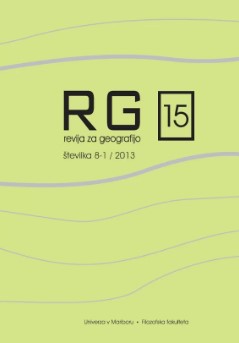Changes in rural development policy - the new development paradigm
DOI:
https://doi.org/10.18690/rg.8.1.3890Keywords:
balance regional development, rural, Leader program, EU, OECD, new rural policy, SloveniaAbstract
The purpose of this article is presenting the new rural development paradigm. For the new approaches to be understood and the effects of the new paradigm to be to analysed, the new paradigm should be explained and substantiated by critical comparison with the old paradigm. Numerous, mostly foreign authors, involved in theoretical as well as practical development of agriculture and rural areas, note that the success of the new paradigm directly depends on both, political will at the multi-institutional level as well as on readiness to accept new guidelines. Globally, the bottom-up approach has become established. Agriculture as an economic sector is no longer in the forefront. Changes in rural areas development paradigm started to emerge in the second half of the Twentieth century as a consequence of de-industrialisation effects and after the enlargement of the EU to the Mediterranean countries. By Agenda 2000, Leader programmes, the foundations were laid for the new development paradigm which became global in 2006 by publishing the new OECD rural development paradigm. In the conclusion, we were interested in the response of Slovenian rural policy to these changes and in the reasons for slow implementation of new approaches towards development of agriculture and rural areas.
Downloads
References
Agenda 2000: http://ec.europa.eu/agriculture/cap-history/agenda-2000/index_en.htm
Bryden, J.M. 2000: Is there a ‘New Rural Policy’ ? International Conference on European Rural Policy at the Crossoads. University of Aberdeen, Kings College: The Arkleton Centre for Rural Development Research, June 29-July 1 2000. http://scholar.google.si/scholar?q=john+m+bryden+is+there+a+new+rural+polocy&btnG=&hl=sl&as_sdt=0%2C5
Evropska komisija 2006: The Leader Approach - A basic guide. Luxembourg: Publications Office of the European Union, 2006, ISBN 92-79-02044-7.
Evropska komisija 2008: Izbor najboljših praks, Program Leader+. Agri-Leaderplus-Publications, 2008/2, ISBN 978-92-79-06444-9.
Evropska komisija 2011: Commission Staff Working Paper, Executive Summary of the Impact Assessment, Common Agricultural Policy towards 2020. Brussels, 20.10.2011, SEC(2011) 1154 final/2.
Evropska komisija 2012: The Common Agricultural Policy - A partnership between Europe and Farmers. Luxembourg: Publications Office of the European Union, 2012, ISBN 978-92-79-22067-8, doi:10.2762/31102.
Krugman, P. 1991: Geography and trade. MIT Press, Cambridge MA.
Lorber, L. 1999a: Procesi prestrukturiranja industrije Maribora i njihov utjecaj na transformaciju prostora, doktorska disertacija, Zagreb, 223pp.
Lorber, L. 1999b: The economic transition of Slovenia in the process of globalization. Geografski zbornik 39, 133-166. http://www.zrc-sazu.si/giam/zbornik/lorber_39.pdf
Lorber, L. 2005: Regional development problems of Podravje. Podravina 4, no. 8, Samobor 107-120. http://hrcak.srce.hr/index.php?show=clanak&id_clanak_jezik=116624
Martin, R. 2003: Putting the Economy in its Place: On Economics and Geography, Paper presented at the Cambridge Journal of Economics Conference, 26pp.
Natura 2000: http://ec.europa.eu/environment/nature/info/pubs/paper_en.htm
Neal, A. 2012: Conference "The CAP towards 2020 – taking stock with civil society" Summary document of the Workshops drawn up by the rapporteurs, Workshop 3: CAP & balanced territorial development.
Nowicki, P. 2012: Conference "The CAP towards 2020 – taking stock with civil society" Summary document of the Workshops drawn up by the rapporteurs, Workshop 2: CAP and natural resources.
OECD 2006: The New Rural Paradigm: Policies and Governance. OECD Rural Policy Reviews, ISBN 92-64-02390-9.
Sorrentino, A. 2012: Conference "The CAP towards 2020 – taking stock with civil society" Summary document of the Workshops drawn up by the rapporteurs, Workshop 1: CAP and food security.
Voutilainen, O., Wuori, O. 2012: Rural Development within the Context of Agricultural and Socio-economic Trends – The Case of Finland. European Countryside 4, 2012, p. 283-302
Downloads
Published
Issue
Section
License
Copyright (c) 2013 Lučka Lorber

This work is licensed under a Creative Commons Attribution 4.0 International License.
